Business Law Report: Sovereignty, UK Laws, Business Applications
VerifiedAdded on 2020/10/05
|15
|4612
|322
Report
AI Summary
This report provides a comprehensive overview of UK business law. It begins by defining sovereignty and explaining the UK Parliament's role. It then details the sources of UK law, including statutory, common, and equity law, and the process of drafting a bill. The report further explains the applicability of laws to businesses, differentiating between incorporated and unincorporated structures. It also explores the legal implications of non-compliance with laws and provides solutions for case studies related to business law. The report covers topics such as the impact of company law, contract law, and consumer protection law on business operations, emphasizing the importance of legal compliance and providing insights into the UK legal system's influence on businesses. Finally, the report discusses the effectiveness of the legal system in terms of recent reforms and developments.
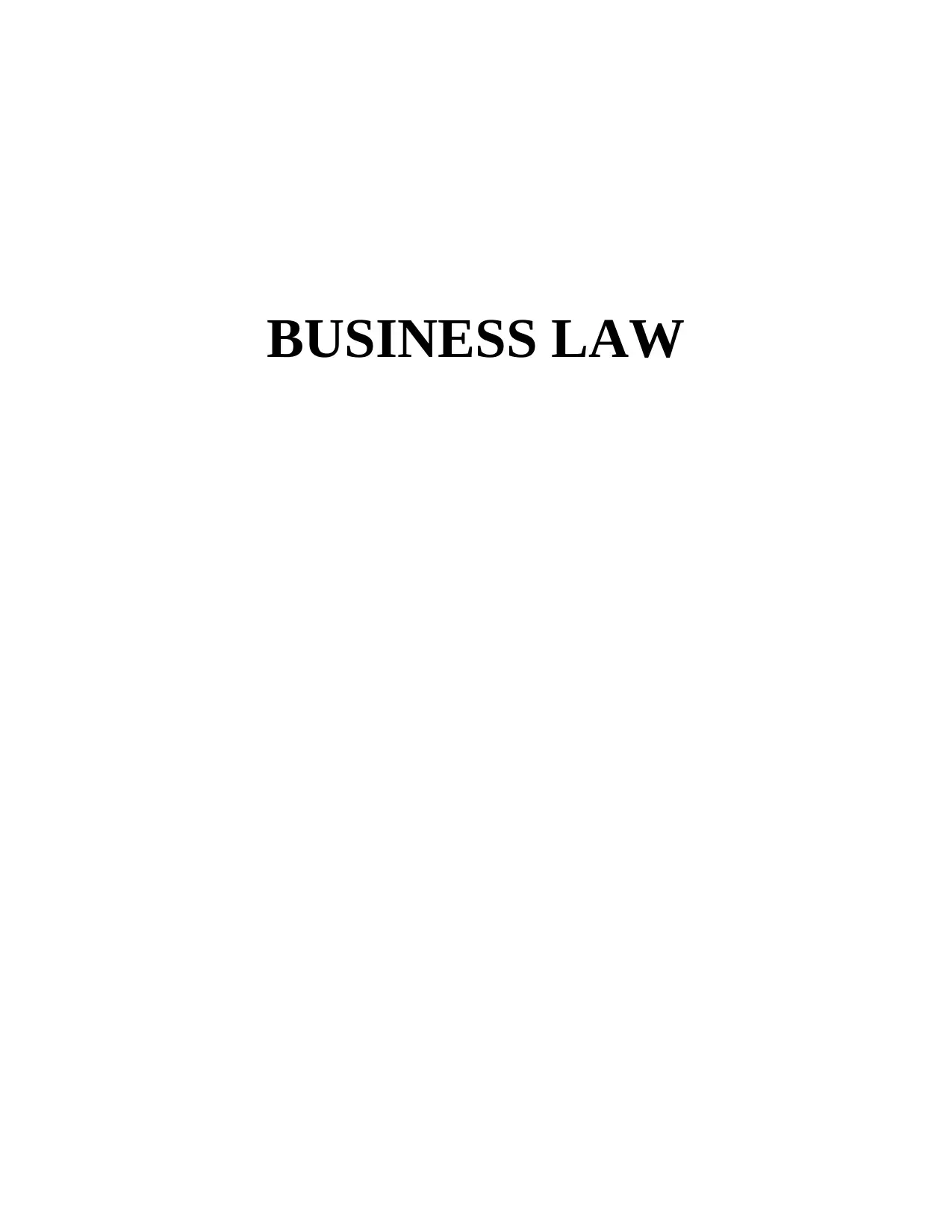
BUSINESS LAW
Paraphrase This Document
Need a fresh take? Get an instant paraphrase of this document with our AI Paraphraser
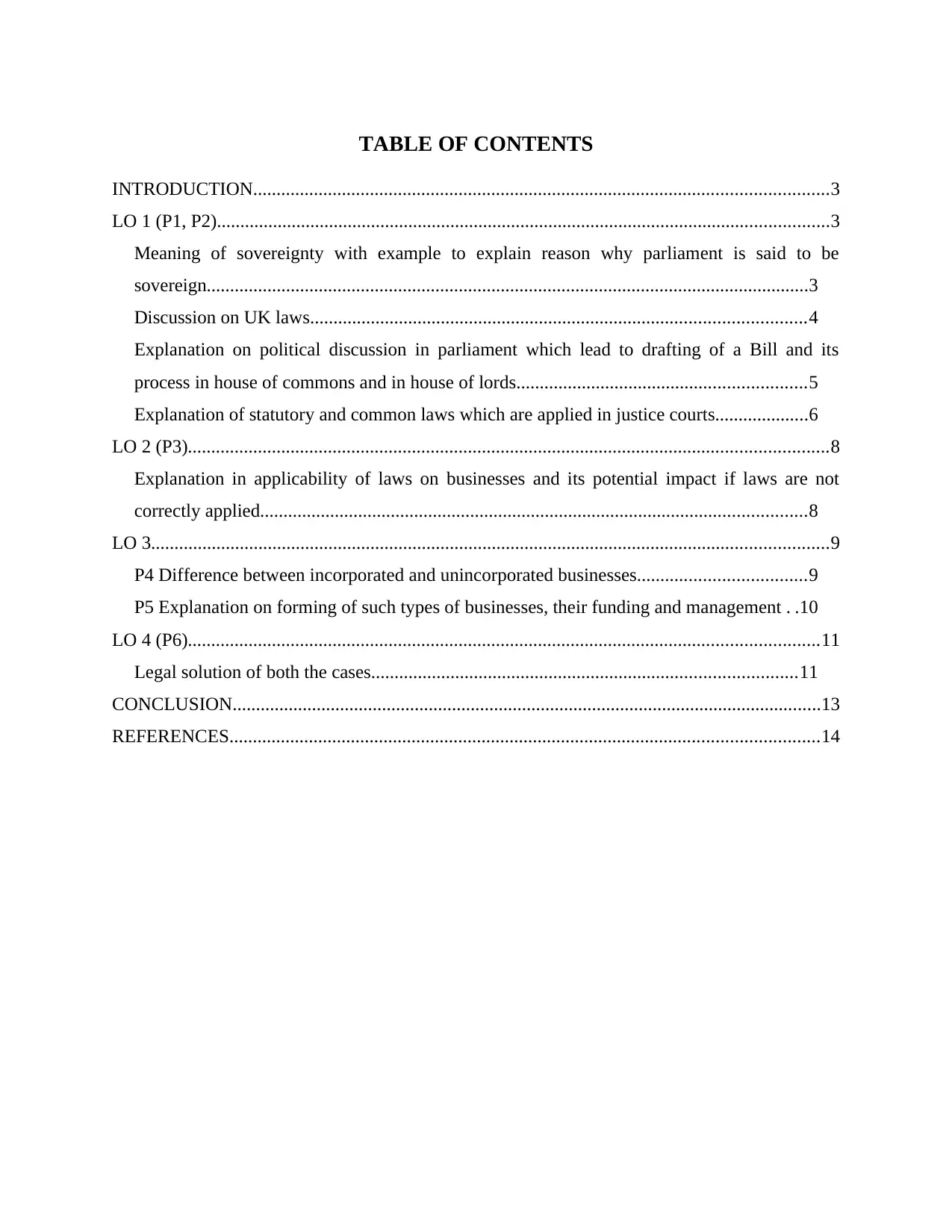
TABLE OF CONTENTS
INTRODUCTION...........................................................................................................................3
LO 1 (P1, P2)...................................................................................................................................3
Meaning of sovereignty with example to explain reason why parliament is said to be
sovereign.................................................................................................................................3
Discussion on UK laws..........................................................................................................4
Explanation on political discussion in parliament which lead to drafting of a Bill and its
process in house of commons and in house of lords..............................................................5
Explanation of statutory and common laws which are applied in justice courts....................6
LO 2 (P3).........................................................................................................................................8
Explanation in applicability of laws on businesses and its potential impact if laws are not
correctly applied.....................................................................................................................8
LO 3.................................................................................................................................................9
P4 Difference between incorporated and unincorporated businesses....................................9
P5 Explanation on forming of such types of businesses, their funding and management . .10
LO 4 (P6).......................................................................................................................................11
Legal solution of both the cases...........................................................................................11
CONCLUSION..............................................................................................................................13
REFERENCES..............................................................................................................................14
INTRODUCTION...........................................................................................................................3
LO 1 (P1, P2)...................................................................................................................................3
Meaning of sovereignty with example to explain reason why parliament is said to be
sovereign.................................................................................................................................3
Discussion on UK laws..........................................................................................................4
Explanation on political discussion in parliament which lead to drafting of a Bill and its
process in house of commons and in house of lords..............................................................5
Explanation of statutory and common laws which are applied in justice courts....................6
LO 2 (P3).........................................................................................................................................8
Explanation in applicability of laws on businesses and its potential impact if laws are not
correctly applied.....................................................................................................................8
LO 3.................................................................................................................................................9
P4 Difference between incorporated and unincorporated businesses....................................9
P5 Explanation on forming of such types of businesses, their funding and management . .10
LO 4 (P6).......................................................................................................................................11
Legal solution of both the cases...........................................................................................11
CONCLUSION..............................................................................................................................13
REFERENCES..............................................................................................................................14
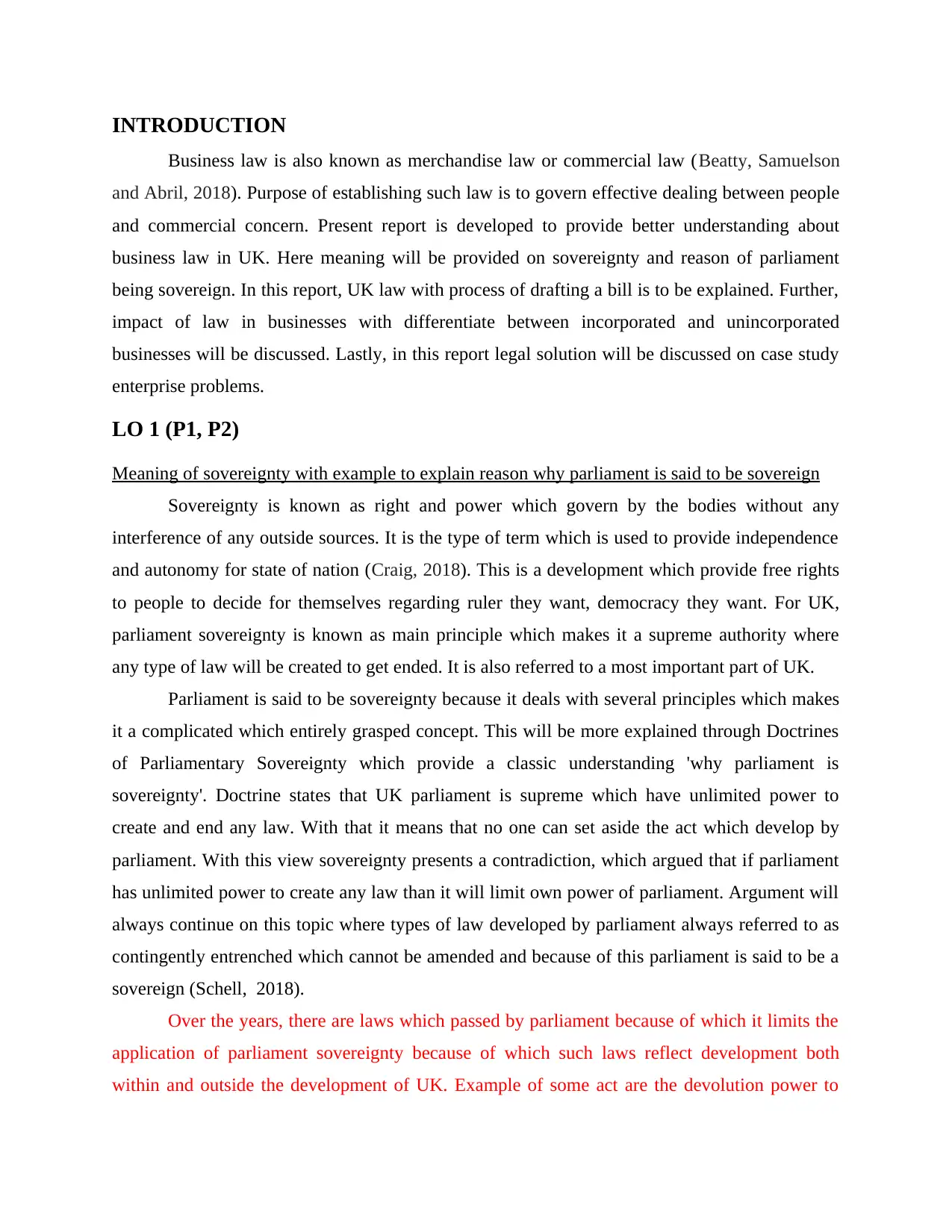
INTRODUCTION
Business law is also known as merchandise law or commercial law (Beatty, Samuelson
and Abril, 2018). Purpose of establishing such law is to govern effective dealing between people
and commercial concern. Present report is developed to provide better understanding about
business law in UK. Here meaning will be provided on sovereignty and reason of parliament
being sovereign. In this report, UK law with process of drafting a bill is to be explained. Further,
impact of law in businesses with differentiate between incorporated and unincorporated
businesses will be discussed. Lastly, in this report legal solution will be discussed on case study
enterprise problems.
LO 1 (P1, P2)
Meaning of sovereignty with example to explain reason why parliament is said to be sovereign
Sovereignty is known as right and power which govern by the bodies without any
interference of any outside sources. It is the type of term which is used to provide independence
and autonomy for state of nation (Craig, 2018). This is a development which provide free rights
to people to decide for themselves regarding ruler they want, democracy they want. For UK,
parliament sovereignty is known as main principle which makes it a supreme authority where
any type of law will be created to get ended. It is also referred to a most important part of UK.
Parliament is said to be sovereignty because it deals with several principles which makes
it a complicated which entirely grasped concept. This will be more explained through Doctrines
of Parliamentary Sovereignty which provide a classic understanding 'why parliament is
sovereignty'. Doctrine states that UK parliament is supreme which have unlimited power to
create and end any law. With that it means that no one can set aside the act which develop by
parliament. With this view sovereignty presents a contradiction, which argued that if parliament
has unlimited power to create any law than it will limit own power of parliament. Argument will
always continue on this topic where types of law developed by parliament always referred to as
contingently entrenched which cannot be amended and because of this parliament is said to be a
sovereign (Schell, 2018).
Over the years, there are laws which passed by parliament because of which it limits the
application of parliament sovereignty because of which such laws reflect development both
within and outside the development of UK. Example of some act are the devolution power to
Business law is also known as merchandise law or commercial law (Beatty, Samuelson
and Abril, 2018). Purpose of establishing such law is to govern effective dealing between people
and commercial concern. Present report is developed to provide better understanding about
business law in UK. Here meaning will be provided on sovereignty and reason of parliament
being sovereign. In this report, UK law with process of drafting a bill is to be explained. Further,
impact of law in businesses with differentiate between incorporated and unincorporated
businesses will be discussed. Lastly, in this report legal solution will be discussed on case study
enterprise problems.
LO 1 (P1, P2)
Meaning of sovereignty with example to explain reason why parliament is said to be sovereign
Sovereignty is known as right and power which govern by the bodies without any
interference of any outside sources. It is the type of term which is used to provide independence
and autonomy for state of nation (Craig, 2018). This is a development which provide free rights
to people to decide for themselves regarding ruler they want, democracy they want. For UK,
parliament sovereignty is known as main principle which makes it a supreme authority where
any type of law will be created to get ended. It is also referred to a most important part of UK.
Parliament is said to be sovereignty because it deals with several principles which makes
it a complicated which entirely grasped concept. This will be more explained through Doctrines
of Parliamentary Sovereignty which provide a classic understanding 'why parliament is
sovereignty'. Doctrine states that UK parliament is supreme which have unlimited power to
create and end any law. With that it means that no one can set aside the act which develop by
parliament. With this view sovereignty presents a contradiction, which argued that if parliament
has unlimited power to create any law than it will limit own power of parliament. Argument will
always continue on this topic where types of law developed by parliament always referred to as
contingently entrenched which cannot be amended and because of this parliament is said to be a
sovereign (Schell, 2018).
Over the years, there are laws which passed by parliament because of which it limits the
application of parliament sovereignty because of which such laws reflect development both
within and outside the development of UK. Example of some act are the devolution power to
⊘ This is a preview!⊘
Do you want full access?
Subscribe today to unlock all pages.

Trusted by 1+ million students worldwide
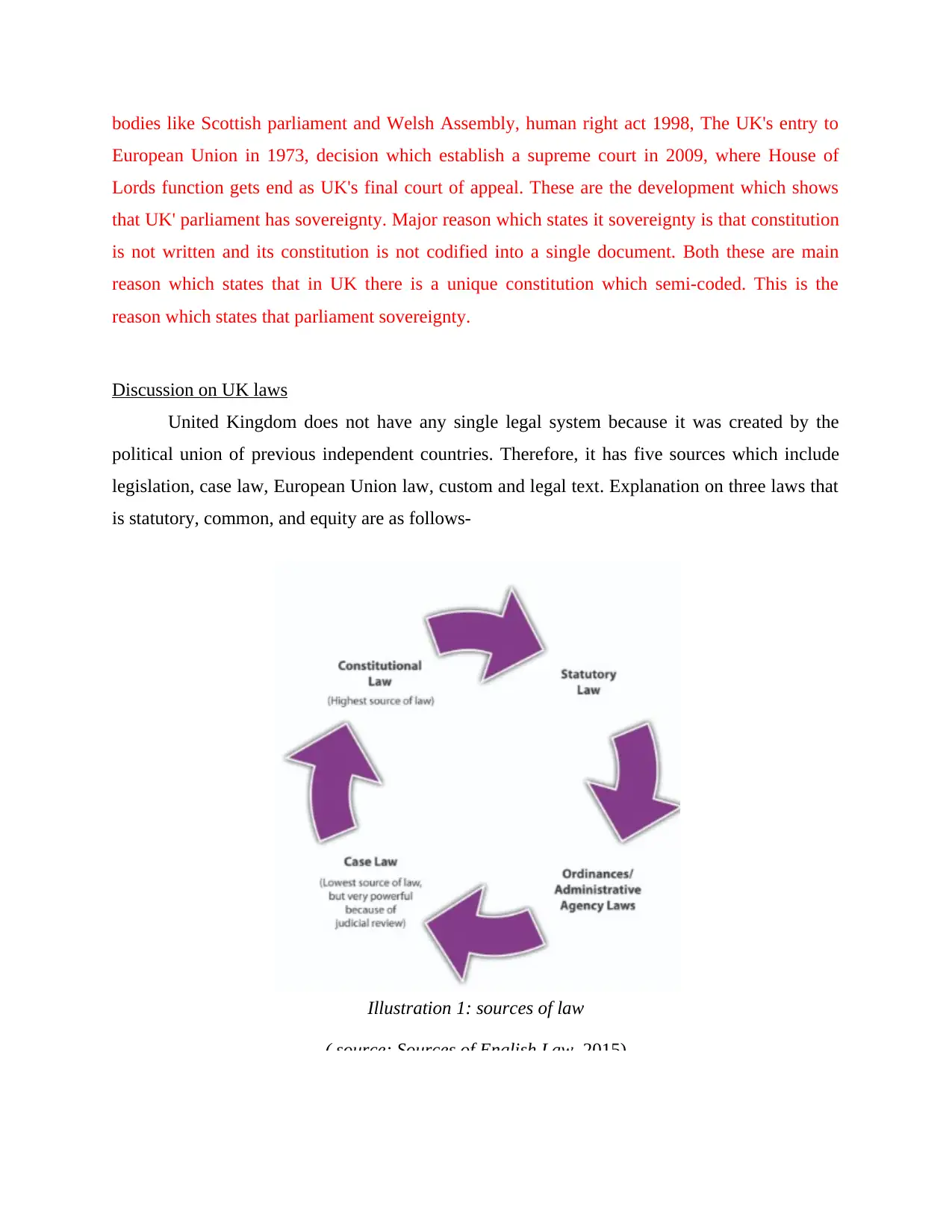
bodies like Scottish parliament and Welsh Assembly, human right act 1998, The UK's entry to
European Union in 1973, decision which establish a supreme court in 2009, where House of
Lords function gets end as UK's final court of appeal. These are the development which shows
that UK' parliament has sovereignty. Major reason which states it sovereignty is that constitution
is not written and its constitution is not codified into a single document. Both these are main
reason which states that in UK there is a unique constitution which semi-coded. This is the
reason which states that parliament sovereignty.
Discussion on UK laws
United Kingdom does not have any single legal system because it was created by the
political union of previous independent countries. Therefore, it has five sources which include
legislation, case law, European Union law, custom and legal text. Explanation on three laws that
is statutory, common, and equity are as follows-
Illustration 1: sources of law
( source: Sources of English Law, 2015)
European Union in 1973, decision which establish a supreme court in 2009, where House of
Lords function gets end as UK's final court of appeal. These are the development which shows
that UK' parliament has sovereignty. Major reason which states it sovereignty is that constitution
is not written and its constitution is not codified into a single document. Both these are main
reason which states that in UK there is a unique constitution which semi-coded. This is the
reason which states that parliament sovereignty.
Discussion on UK laws
United Kingdom does not have any single legal system because it was created by the
political union of previous independent countries. Therefore, it has five sources which include
legislation, case law, European Union law, custom and legal text. Explanation on three laws that
is statutory, common, and equity are as follows-
Illustration 1: sources of law
( source: Sources of English Law, 2015)
Paraphrase This Document
Need a fresh take? Get an instant paraphrase of this document with our AI Paraphraser
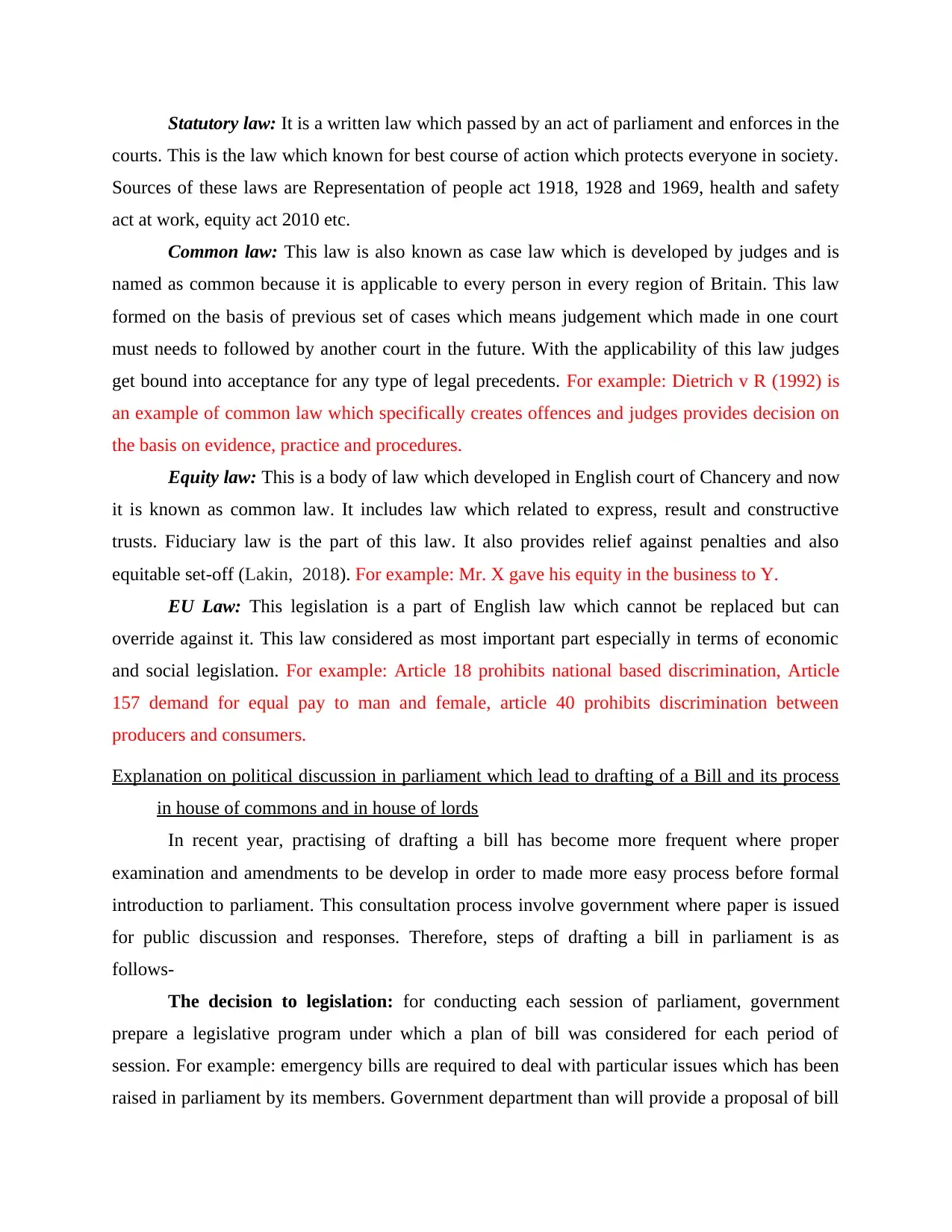
Statutory law: It is a written law which passed by an act of parliament and enforces in the
courts. This is the law which known for best course of action which protects everyone in society.
Sources of these laws are Representation of people act 1918, 1928 and 1969, health and safety
act at work, equity act 2010 etc.
Common law: This law is also known as case law which is developed by judges and is
named as common because it is applicable to every person in every region of Britain. This law
formed on the basis of previous set of cases which means judgement which made in one court
must needs to followed by another court in the future. With the applicability of this law judges
get bound into acceptance for any type of legal precedents. For example: Dietrich v R (1992) is
an example of common law which specifically creates offences and judges provides decision on
the basis on evidence, practice and procedures.
Equity law: This is a body of law which developed in English court of Chancery and now
it is known as common law. It includes law which related to express, result and constructive
trusts. Fiduciary law is the part of this law. It also provides relief against penalties and also
equitable set-off (Lakin, 2018). For example: Mr. X gave his equity in the business to Y.
EU Law: This legislation is a part of English law which cannot be replaced but can
override against it. This law considered as most important part especially in terms of economic
and social legislation. For example: Article 18 prohibits national based discrimination, Article
157 demand for equal pay to man and female, article 40 prohibits discrimination between
producers and consumers.
Explanation on political discussion in parliament which lead to drafting of a Bill and its process
in house of commons and in house of lords
In recent year, practising of drafting a bill has become more frequent where proper
examination and amendments to be develop in order to made more easy process before formal
introduction to parliament. This consultation process involve government where paper is issued
for public discussion and responses. Therefore, steps of drafting a bill in parliament is as
follows-
The decision to legislation: for conducting each session of parliament, government
prepare a legislative program under which a plan of bill was considered for each period of
session. For example: emergency bills are required to deal with particular issues which has been
raised in parliament by its members. Government department than will provide a proposal of bill
courts. This is the law which known for best course of action which protects everyone in society.
Sources of these laws are Representation of people act 1918, 1928 and 1969, health and safety
act at work, equity act 2010 etc.
Common law: This law is also known as case law which is developed by judges and is
named as common because it is applicable to every person in every region of Britain. This law
formed on the basis of previous set of cases which means judgement which made in one court
must needs to followed by another court in the future. With the applicability of this law judges
get bound into acceptance for any type of legal precedents. For example: Dietrich v R (1992) is
an example of common law which specifically creates offences and judges provides decision on
the basis on evidence, practice and procedures.
Equity law: This is a body of law which developed in English court of Chancery and now
it is known as common law. It includes law which related to express, result and constructive
trusts. Fiduciary law is the part of this law. It also provides relief against penalties and also
equitable set-off (Lakin, 2018). For example: Mr. X gave his equity in the business to Y.
EU Law: This legislation is a part of English law which cannot be replaced but can
override against it. This law considered as most important part especially in terms of economic
and social legislation. For example: Article 18 prohibits national based discrimination, Article
157 demand for equal pay to man and female, article 40 prohibits discrimination between
producers and consumers.
Explanation on political discussion in parliament which lead to drafting of a Bill and its process
in house of commons and in house of lords
In recent year, practising of drafting a bill has become more frequent where proper
examination and amendments to be develop in order to made more easy process before formal
introduction to parliament. This consultation process involve government where paper is issued
for public discussion and responses. Therefore, steps of drafting a bill in parliament is as
follows-
The decision to legislation: for conducting each session of parliament, government
prepare a legislative program under which a plan of bill was considered for each period of
session. For example: emergency bills are required to deal with particular issues which has been
raised in parliament by its members. Government department than will provide a proposal of bill
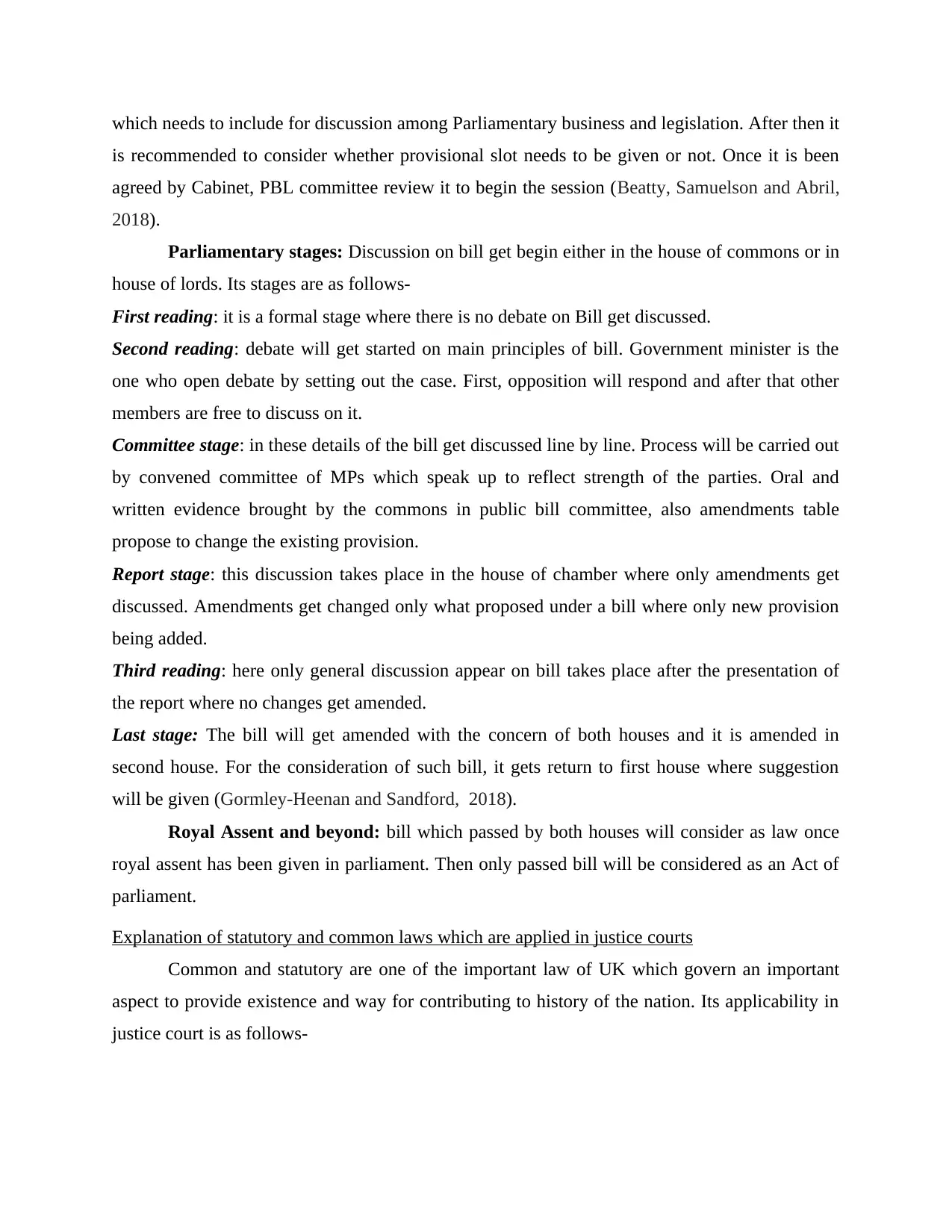
which needs to include for discussion among Parliamentary business and legislation. After then it
is recommended to consider whether provisional slot needs to be given or not. Once it is been
agreed by Cabinet, PBL committee review it to begin the session (Beatty, Samuelson and Abril,
2018).
Parliamentary stages: Discussion on bill get begin either in the house of commons or in
house of lords. Its stages are as follows-
First reading: it is a formal stage where there is no debate on Bill get discussed.
Second reading: debate will get started on main principles of bill. Government minister is the
one who open debate by setting out the case. First, opposition will respond and after that other
members are free to discuss on it.
Committee stage: in these details of the bill get discussed line by line. Process will be carried out
by convened committee of MPs which speak up to reflect strength of the parties. Oral and
written evidence brought by the commons in public bill committee, also amendments table
propose to change the existing provision.
Report stage: this discussion takes place in the house of chamber where only amendments get
discussed. Amendments get changed only what proposed under a bill where only new provision
being added.
Third reading: here only general discussion appear on bill takes place after the presentation of
the report where no changes get amended.
Last stage: The bill will get amended with the concern of both houses and it is amended in
second house. For the consideration of such bill, it gets return to first house where suggestion
will be given (Gormley-Heenan and Sandford, 2018).
Royal Assent and beyond: bill which passed by both houses will consider as law once
royal assent has been given in parliament. Then only passed bill will be considered as an Act of
parliament.
Explanation of statutory and common laws which are applied in justice courts
Common and statutory are one of the important law of UK which govern an important
aspect to provide existence and way for contributing to history of the nation. Its applicability in
justice court is as follows-
is recommended to consider whether provisional slot needs to be given or not. Once it is been
agreed by Cabinet, PBL committee review it to begin the session (Beatty, Samuelson and Abril,
2018).
Parliamentary stages: Discussion on bill get begin either in the house of commons or in
house of lords. Its stages are as follows-
First reading: it is a formal stage where there is no debate on Bill get discussed.
Second reading: debate will get started on main principles of bill. Government minister is the
one who open debate by setting out the case. First, opposition will respond and after that other
members are free to discuss on it.
Committee stage: in these details of the bill get discussed line by line. Process will be carried out
by convened committee of MPs which speak up to reflect strength of the parties. Oral and
written evidence brought by the commons in public bill committee, also amendments table
propose to change the existing provision.
Report stage: this discussion takes place in the house of chamber where only amendments get
discussed. Amendments get changed only what proposed under a bill where only new provision
being added.
Third reading: here only general discussion appear on bill takes place after the presentation of
the report where no changes get amended.
Last stage: The bill will get amended with the concern of both houses and it is amended in
second house. For the consideration of such bill, it gets return to first house where suggestion
will be given (Gormley-Heenan and Sandford, 2018).
Royal Assent and beyond: bill which passed by both houses will consider as law once
royal assent has been given in parliament. Then only passed bill will be considered as an Act of
parliament.
Explanation of statutory and common laws which are applied in justice courts
Common and statutory are one of the important law of UK which govern an important
aspect to provide existence and way for contributing to history of the nation. Its applicability in
justice court is as follows-
⊘ This is a preview!⊘
Do you want full access?
Subscribe today to unlock all pages.

Trusted by 1+ million students worldwide
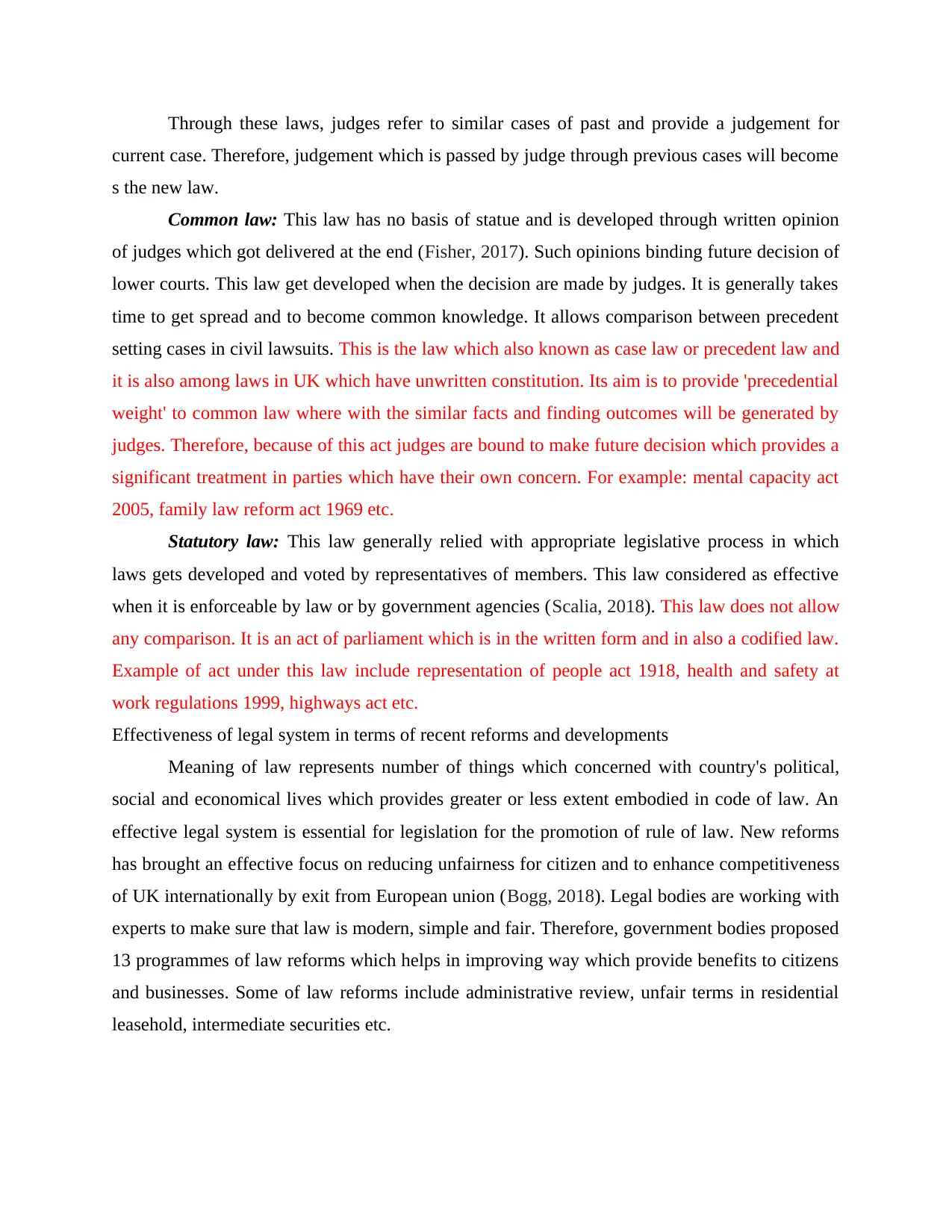
Through these laws, judges refer to similar cases of past and provide a judgement for
current case. Therefore, judgement which is passed by judge through previous cases will become
s the new law.
Common law: This law has no basis of statue and is developed through written opinion
of judges which got delivered at the end (Fisher, 2017). Such opinions binding future decision of
lower courts. This law get developed when the decision are made by judges. It is generally takes
time to get spread and to become common knowledge. It allows comparison between precedent
setting cases in civil lawsuits. This is the law which also known as case law or precedent law and
it is also among laws in UK which have unwritten constitution. Its aim is to provide 'precedential
weight' to common law where with the similar facts and finding outcomes will be generated by
judges. Therefore, because of this act judges are bound to make future decision which provides a
significant treatment in parties which have their own concern. For example: mental capacity act
2005, family law reform act 1969 etc.
Statutory law: This law generally relied with appropriate legislative process in which
laws gets developed and voted by representatives of members. This law considered as effective
when it is enforceable by law or by government agencies (Scalia, 2018). This law does not allow
any comparison. It is an act of parliament which is in the written form and in also a codified law.
Example of act under this law include representation of people act 1918, health and safety at
work regulations 1999, highways act etc.
Effectiveness of legal system in terms of recent reforms and developments
Meaning of law represents number of things which concerned with country's political,
social and economical lives which provides greater or less extent embodied in code of law. An
effective legal system is essential for legislation for the promotion of rule of law. New reforms
has brought an effective focus on reducing unfairness for citizen and to enhance competitiveness
of UK internationally by exit from European union (Bogg, 2018). Legal bodies are working with
experts to make sure that law is modern, simple and fair. Therefore, government bodies proposed
13 programmes of law reforms which helps in improving way which provide benefits to citizens
and businesses. Some of law reforms include administrative review, unfair terms in residential
leasehold, intermediate securities etc.
current case. Therefore, judgement which is passed by judge through previous cases will become
s the new law.
Common law: This law has no basis of statue and is developed through written opinion
of judges which got delivered at the end (Fisher, 2017). Such opinions binding future decision of
lower courts. This law get developed when the decision are made by judges. It is generally takes
time to get spread and to become common knowledge. It allows comparison between precedent
setting cases in civil lawsuits. This is the law which also known as case law or precedent law and
it is also among laws in UK which have unwritten constitution. Its aim is to provide 'precedential
weight' to common law where with the similar facts and finding outcomes will be generated by
judges. Therefore, because of this act judges are bound to make future decision which provides a
significant treatment in parties which have their own concern. For example: mental capacity act
2005, family law reform act 1969 etc.
Statutory law: This law generally relied with appropriate legislative process in which
laws gets developed and voted by representatives of members. This law considered as effective
when it is enforceable by law or by government agencies (Scalia, 2018). This law does not allow
any comparison. It is an act of parliament which is in the written form and in also a codified law.
Example of act under this law include representation of people act 1918, health and safety at
work regulations 1999, highways act etc.
Effectiveness of legal system in terms of recent reforms and developments
Meaning of law represents number of things which concerned with country's political,
social and economical lives which provides greater or less extent embodied in code of law. An
effective legal system is essential for legislation for the promotion of rule of law. New reforms
has brought an effective focus on reducing unfairness for citizen and to enhance competitiveness
of UK internationally by exit from European union (Bogg, 2018). Legal bodies are working with
experts to make sure that law is modern, simple and fair. Therefore, government bodies proposed
13 programmes of law reforms which helps in improving way which provide benefits to citizens
and businesses. Some of law reforms include administrative review, unfair terms in residential
leasehold, intermediate securities etc.
Paraphrase This Document
Need a fresh take? Get an instant paraphrase of this document with our AI Paraphraser
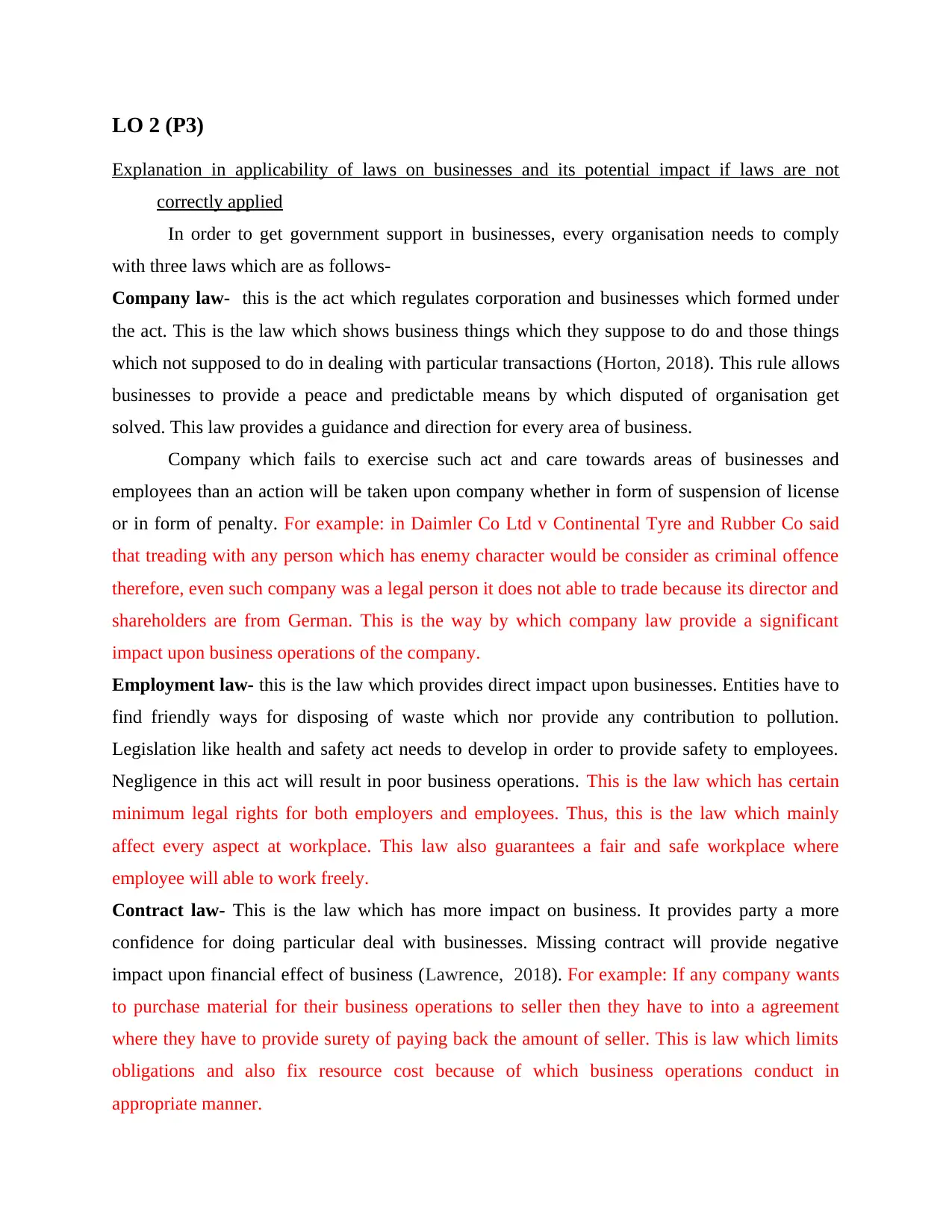
LO 2 (P3)
Explanation in applicability of laws on businesses and its potential impact if laws are not
correctly applied
In order to get government support in businesses, every organisation needs to comply
with three laws which are as follows-
Company law- this is the act which regulates corporation and businesses which formed under
the act. This is the law which shows business things which they suppose to do and those things
which not supposed to do in dealing with particular transactions (Horton, 2018). This rule allows
businesses to provide a peace and predictable means by which disputed of organisation get
solved. This law provides a guidance and direction for every area of business.
Company which fails to exercise such act and care towards areas of businesses and
employees than an action will be taken upon company whether in form of suspension of license
or in form of penalty. For example: in Daimler Co Ltd v Continental Tyre and Rubber Co said
that treading with any person which has enemy character would be consider as criminal offence
therefore, even such company was a legal person it does not able to trade because its director and
shareholders are from German. This is the way by which company law provide a significant
impact upon business operations of the company.
Employment law- this is the law which provides direct impact upon businesses. Entities have to
find friendly ways for disposing of waste which nor provide any contribution to pollution.
Legislation like health and safety act needs to develop in order to provide safety to employees.
Negligence in this act will result in poor business operations. This is the law which has certain
minimum legal rights for both employers and employees. Thus, this is the law which mainly
affect every aspect at workplace. This law also guarantees a fair and safe workplace where
employee will able to work freely.
Contract law- This is the law which has more impact on business. It provides party a more
confidence for doing particular deal with businesses. Missing contract will provide negative
impact upon financial effect of business (Lawrence, 2018). For example: If any company wants
to purchase material for their business operations to seller then they have to into a agreement
where they have to provide surety of paying back the amount of seller. This is law which limits
obligations and also fix resource cost because of which business operations conduct in
appropriate manner.
Explanation in applicability of laws on businesses and its potential impact if laws are not
correctly applied
In order to get government support in businesses, every organisation needs to comply
with three laws which are as follows-
Company law- this is the act which regulates corporation and businesses which formed under
the act. This is the law which shows business things which they suppose to do and those things
which not supposed to do in dealing with particular transactions (Horton, 2018). This rule allows
businesses to provide a peace and predictable means by which disputed of organisation get
solved. This law provides a guidance and direction for every area of business.
Company which fails to exercise such act and care towards areas of businesses and
employees than an action will be taken upon company whether in form of suspension of license
or in form of penalty. For example: in Daimler Co Ltd v Continental Tyre and Rubber Co said
that treading with any person which has enemy character would be consider as criminal offence
therefore, even such company was a legal person it does not able to trade because its director and
shareholders are from German. This is the way by which company law provide a significant
impact upon business operations of the company.
Employment law- this is the law which provides direct impact upon businesses. Entities have to
find friendly ways for disposing of waste which nor provide any contribution to pollution.
Legislation like health and safety act needs to develop in order to provide safety to employees.
Negligence in this act will result in poor business operations. This is the law which has certain
minimum legal rights for both employers and employees. Thus, this is the law which mainly
affect every aspect at workplace. This law also guarantees a fair and safe workplace where
employee will able to work freely.
Contract law- This is the law which has more impact on business. It provides party a more
confidence for doing particular deal with businesses. Missing contract will provide negative
impact upon financial effect of business (Lawrence, 2018). For example: If any company wants
to purchase material for their business operations to seller then they have to into a agreement
where they have to provide surety of paying back the amount of seller. This is law which limits
obligations and also fix resource cost because of which business operations conduct in
appropriate manner.
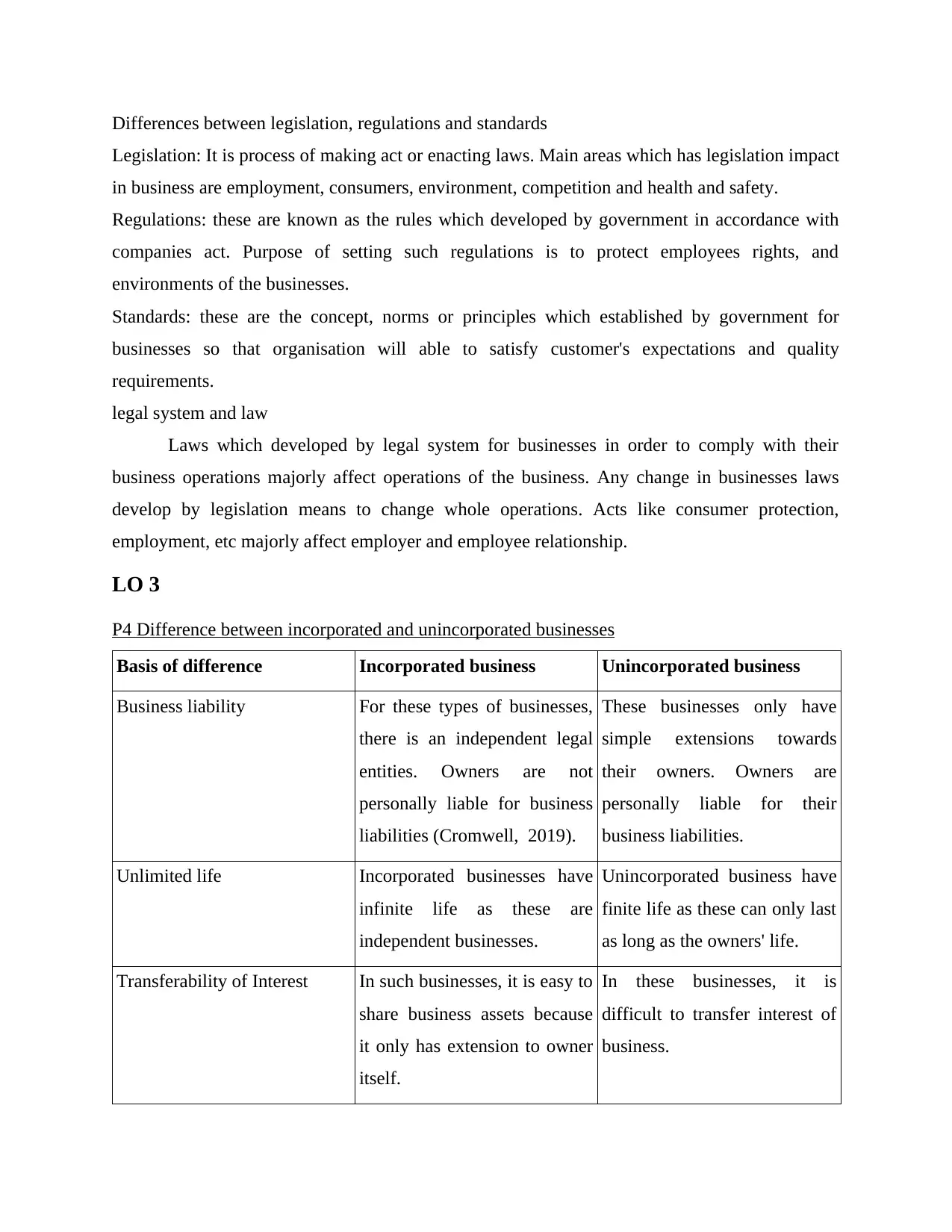
Differences between legislation, regulations and standards
Legislation: It is process of making act or enacting laws. Main areas which has legislation impact
in business are employment, consumers, environment, competition and health and safety.
Regulations: these are known as the rules which developed by government in accordance with
companies act. Purpose of setting such regulations is to protect employees rights, and
environments of the businesses.
Standards: these are the concept, norms or principles which established by government for
businesses so that organisation will able to satisfy customer's expectations and quality
requirements.
legal system and law
Laws which developed by legal system for businesses in order to comply with their
business operations majorly affect operations of the business. Any change in businesses laws
develop by legislation means to change whole operations. Acts like consumer protection,
employment, etc majorly affect employer and employee relationship.
LO 3
P4 Difference between incorporated and unincorporated businesses
Basis of difference Incorporated business Unincorporated business
Business liability For these types of businesses,
there is an independent legal
entities. Owners are not
personally liable for business
liabilities (Cromwell, 2019).
These businesses only have
simple extensions towards
their owners. Owners are
personally liable for their
business liabilities.
Unlimited life Incorporated businesses have
infinite life as these are
independent businesses.
Unincorporated business have
finite life as these can only last
as long as the owners' life.
Transferability of Interest In such businesses, it is easy to
share business assets because
it only has extension to owner
itself.
In these businesses, it is
difficult to transfer interest of
business.
Legislation: It is process of making act or enacting laws. Main areas which has legislation impact
in business are employment, consumers, environment, competition and health and safety.
Regulations: these are known as the rules which developed by government in accordance with
companies act. Purpose of setting such regulations is to protect employees rights, and
environments of the businesses.
Standards: these are the concept, norms or principles which established by government for
businesses so that organisation will able to satisfy customer's expectations and quality
requirements.
legal system and law
Laws which developed by legal system for businesses in order to comply with their
business operations majorly affect operations of the business. Any change in businesses laws
develop by legislation means to change whole operations. Acts like consumer protection,
employment, etc majorly affect employer and employee relationship.
LO 3
P4 Difference between incorporated and unincorporated businesses
Basis of difference Incorporated business Unincorporated business
Business liability For these types of businesses,
there is an independent legal
entities. Owners are not
personally liable for business
liabilities (Cromwell, 2019).
These businesses only have
simple extensions towards
their owners. Owners are
personally liable for their
business liabilities.
Unlimited life Incorporated businesses have
infinite life as these are
independent businesses.
Unincorporated business have
finite life as these can only last
as long as the owners' life.
Transferability of Interest In such businesses, it is easy to
share business assets because
it only has extension to owner
itself.
In these businesses, it is
difficult to transfer interest of
business.
⊘ This is a preview!⊘
Do you want full access?
Subscribe today to unlock all pages.

Trusted by 1+ million students worldwide
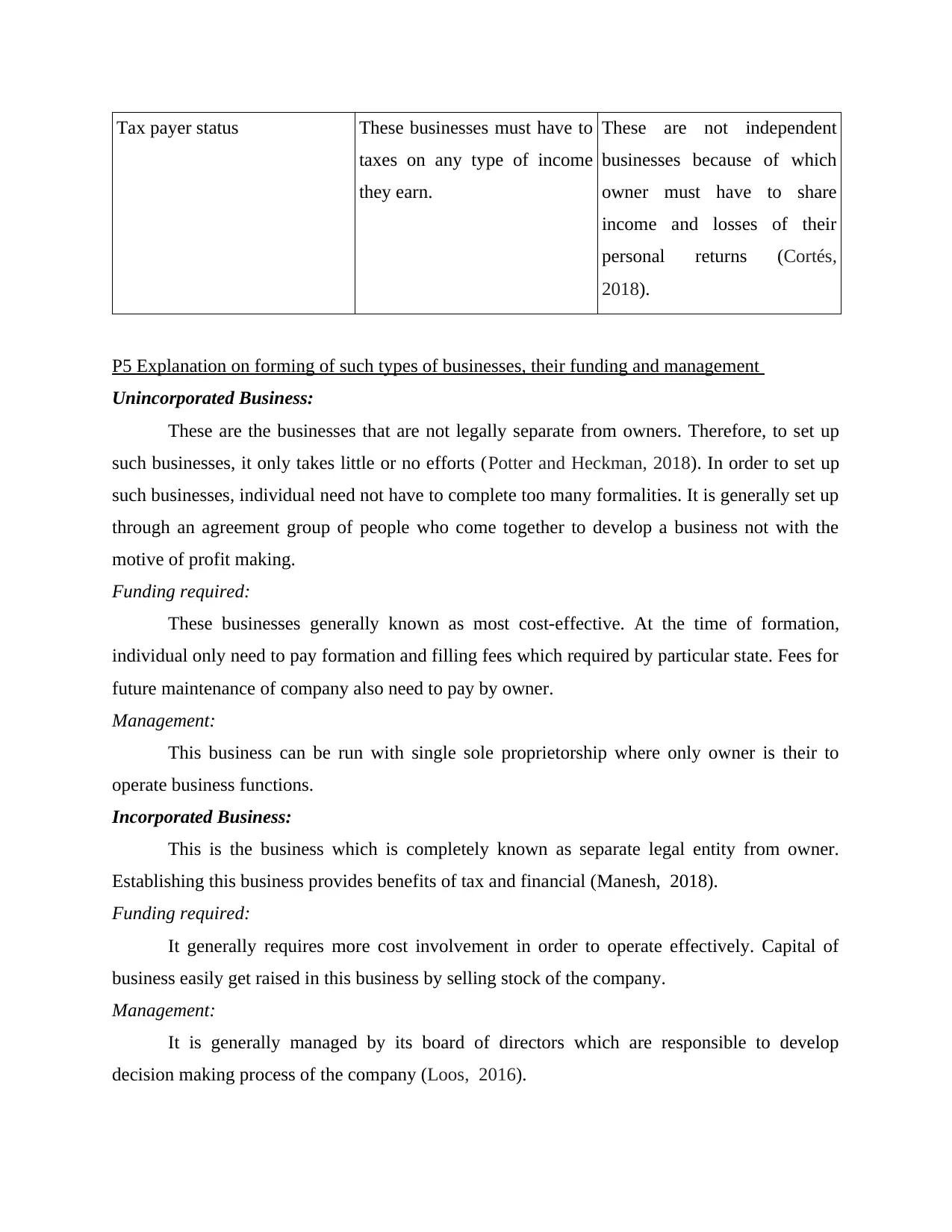
Tax payer status These businesses must have to
taxes on any type of income
they earn.
These are not independent
businesses because of which
owner must have to share
income and losses of their
personal returns (Cortés,
2018).
P5 Explanation on forming of such types of businesses, their funding and management
Unincorporated Business:
These are the businesses that are not legally separate from owners. Therefore, to set up
such businesses, it only takes little or no efforts (Potter and Heckman, 2018). In order to set up
such businesses, individual need not have to complete too many formalities. It is generally set up
through an agreement group of people who come together to develop a business not with the
motive of profit making.
Funding required:
These businesses generally known as most cost-effective. At the time of formation,
individual only need to pay formation and filling fees which required by particular state. Fees for
future maintenance of company also need to pay by owner.
Management:
This business can be run with single sole proprietorship where only owner is their to
operate business functions.
Incorporated Business:
This is the business which is completely known as separate legal entity from owner.
Establishing this business provides benefits of tax and financial (Manesh, 2018).
Funding required:
It generally requires more cost involvement in order to operate effectively. Capital of
business easily get raised in this business by selling stock of the company.
Management:
It is generally managed by its board of directors which are responsible to develop
decision making process of the company (Loos, 2016).
taxes on any type of income
they earn.
These are not independent
businesses because of which
owner must have to share
income and losses of their
personal returns (Cortés,
2018).
P5 Explanation on forming of such types of businesses, their funding and management
Unincorporated Business:
These are the businesses that are not legally separate from owners. Therefore, to set up
such businesses, it only takes little or no efforts (Potter and Heckman, 2018). In order to set up
such businesses, individual need not have to complete too many formalities. It is generally set up
through an agreement group of people who come together to develop a business not with the
motive of profit making.
Funding required:
These businesses generally known as most cost-effective. At the time of formation,
individual only need to pay formation and filling fees which required by particular state. Fees for
future maintenance of company also need to pay by owner.
Management:
This business can be run with single sole proprietorship where only owner is their to
operate business functions.
Incorporated Business:
This is the business which is completely known as separate legal entity from owner.
Establishing this business provides benefits of tax and financial (Manesh, 2018).
Funding required:
It generally requires more cost involvement in order to operate effectively. Capital of
business easily get raised in this business by selling stock of the company.
Management:
It is generally managed by its board of directors which are responsible to develop
decision making process of the company (Loos, 2016).
Paraphrase This Document
Need a fresh take? Get an instant paraphrase of this document with our AI Paraphraser
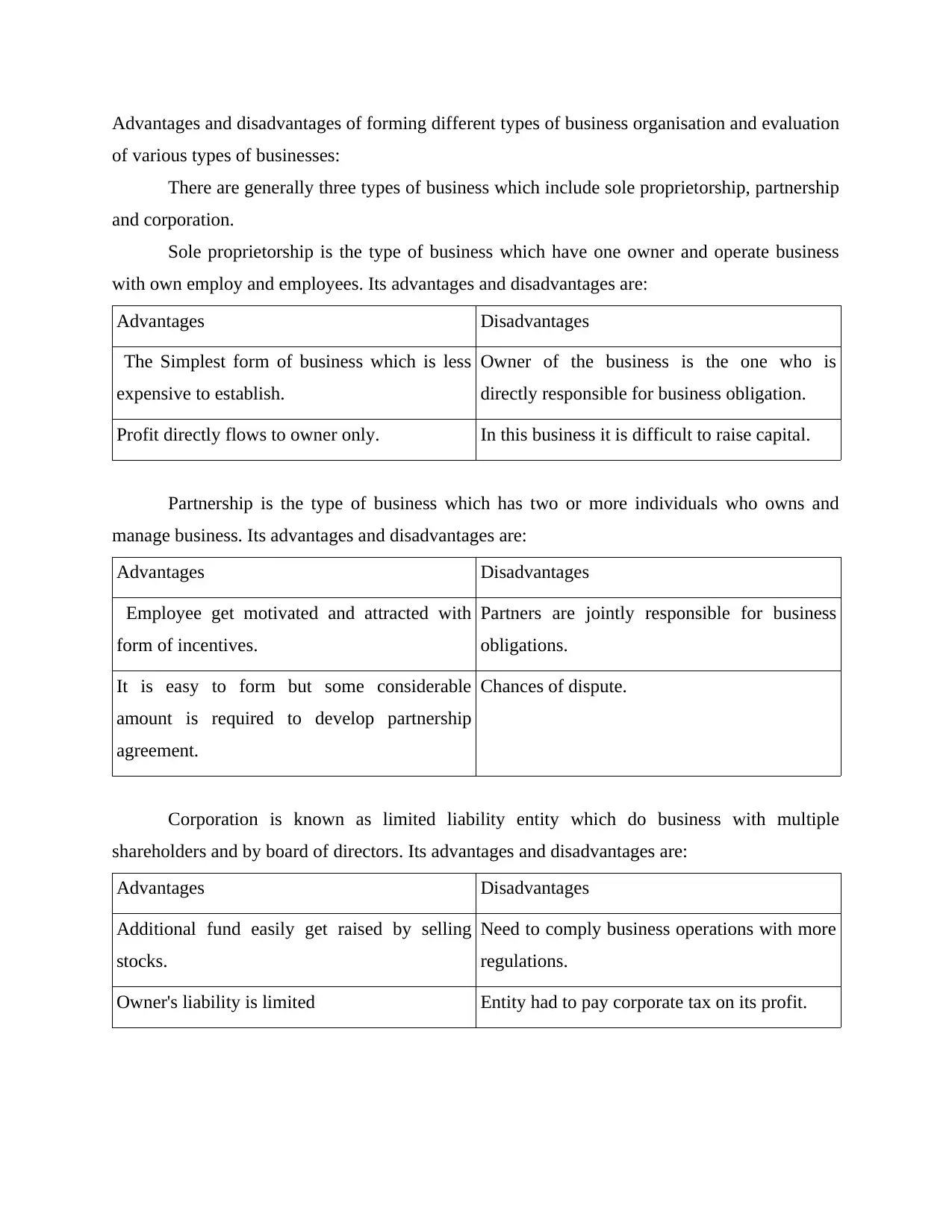
Advantages and disadvantages of forming different types of business organisation and evaluation
of various types of businesses:
There are generally three types of business which include sole proprietorship, partnership
and corporation.
Sole proprietorship is the type of business which have one owner and operate business
with own employ and employees. Its advantages and disadvantages are:
Advantages Disadvantages
The Simplest form of business which is less
expensive to establish.
Owner of the business is the one who is
directly responsible for business obligation.
Profit directly flows to owner only. In this business it is difficult to raise capital.
Partnership is the type of business which has two or more individuals who owns and
manage business. Its advantages and disadvantages are:
Advantages Disadvantages
Employee get motivated and attracted with
form of incentives.
Partners are jointly responsible for business
obligations.
It is easy to form but some considerable
amount is required to develop partnership
agreement.
Chances of dispute.
Corporation is known as limited liability entity which do business with multiple
shareholders and by board of directors. Its advantages and disadvantages are:
Advantages Disadvantages
Additional fund easily get raised by selling
stocks.
Need to comply business operations with more
regulations.
Owner's liability is limited Entity had to pay corporate tax on its profit.
of various types of businesses:
There are generally three types of business which include sole proprietorship, partnership
and corporation.
Sole proprietorship is the type of business which have one owner and operate business
with own employ and employees. Its advantages and disadvantages are:
Advantages Disadvantages
The Simplest form of business which is less
expensive to establish.
Owner of the business is the one who is
directly responsible for business obligation.
Profit directly flows to owner only. In this business it is difficult to raise capital.
Partnership is the type of business which has two or more individuals who owns and
manage business. Its advantages and disadvantages are:
Advantages Disadvantages
Employee get motivated and attracted with
form of incentives.
Partners are jointly responsible for business
obligations.
It is easy to form but some considerable
amount is required to develop partnership
agreement.
Chances of dispute.
Corporation is known as limited liability entity which do business with multiple
shareholders and by board of directors. Its advantages and disadvantages are:
Advantages Disadvantages
Additional fund easily get raised by selling
stocks.
Need to comply business operations with more
regulations.
Owner's liability is limited Entity had to pay corporate tax on its profit.
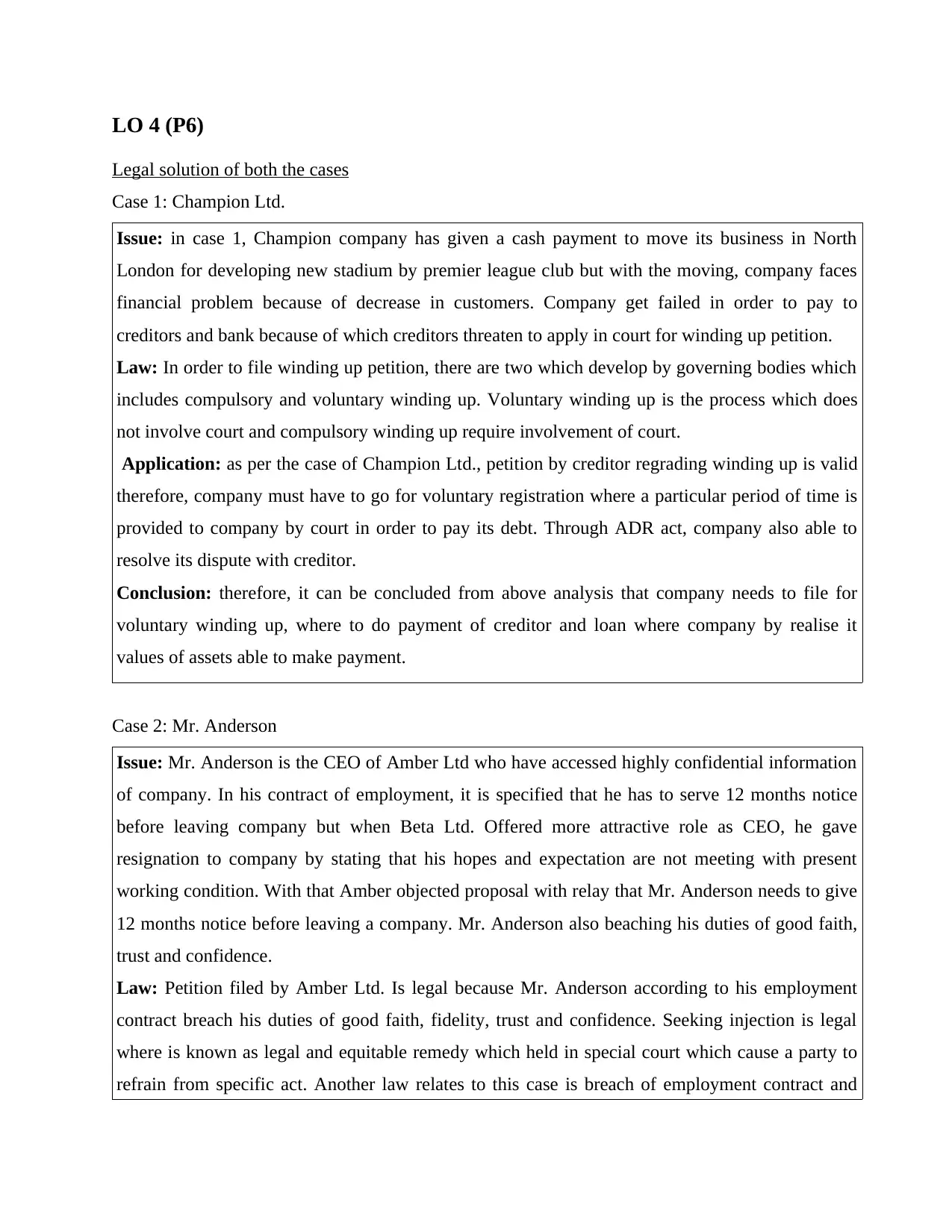
LO 4 (P6)
Legal solution of both the cases
Case 1: Champion Ltd.
Issue: in case 1, Champion company has given a cash payment to move its business in North
London for developing new stadium by premier league club but with the moving, company faces
financial problem because of decrease in customers. Company get failed in order to pay to
creditors and bank because of which creditors threaten to apply in court for winding up petition.
Law: In order to file winding up petition, there are two which develop by governing bodies which
includes compulsory and voluntary winding up. Voluntary winding up is the process which does
not involve court and compulsory winding up require involvement of court.
Application: as per the case of Champion Ltd., petition by creditor regrading winding up is valid
therefore, company must have to go for voluntary registration where a particular period of time is
provided to company by court in order to pay its debt. Through ADR act, company also able to
resolve its dispute with creditor.
Conclusion: therefore, it can be concluded from above analysis that company needs to file for
voluntary winding up, where to do payment of creditor and loan where company by realise it
values of assets able to make payment.
Case 2: Mr. Anderson
Issue: Mr. Anderson is the CEO of Amber Ltd who have accessed highly confidential information
of company. In his contract of employment, it is specified that he has to serve 12 months notice
before leaving company but when Beta Ltd. Offered more attractive role as CEO, he gave
resignation to company by stating that his hopes and expectation are not meeting with present
working condition. With that Amber objected proposal with relay that Mr. Anderson needs to give
12 months notice before leaving a company. Mr. Anderson also beaching his duties of good faith,
trust and confidence.
Law: Petition filed by Amber Ltd. Is legal because Mr. Anderson according to his employment
contract breach his duties of good faith, fidelity, trust and confidence. Seeking injection is legal
where is known as legal and equitable remedy which held in special court which cause a party to
refrain from specific act. Another law relates to this case is breach of employment contract and
Legal solution of both the cases
Case 1: Champion Ltd.
Issue: in case 1, Champion company has given a cash payment to move its business in North
London for developing new stadium by premier league club but with the moving, company faces
financial problem because of decrease in customers. Company get failed in order to pay to
creditors and bank because of which creditors threaten to apply in court for winding up petition.
Law: In order to file winding up petition, there are two which develop by governing bodies which
includes compulsory and voluntary winding up. Voluntary winding up is the process which does
not involve court and compulsory winding up require involvement of court.
Application: as per the case of Champion Ltd., petition by creditor regrading winding up is valid
therefore, company must have to go for voluntary registration where a particular period of time is
provided to company by court in order to pay its debt. Through ADR act, company also able to
resolve its dispute with creditor.
Conclusion: therefore, it can be concluded from above analysis that company needs to file for
voluntary winding up, where to do payment of creditor and loan where company by realise it
values of assets able to make payment.
Case 2: Mr. Anderson
Issue: Mr. Anderson is the CEO of Amber Ltd who have accessed highly confidential information
of company. In his contract of employment, it is specified that he has to serve 12 months notice
before leaving company but when Beta Ltd. Offered more attractive role as CEO, he gave
resignation to company by stating that his hopes and expectation are not meeting with present
working condition. With that Amber objected proposal with relay that Mr. Anderson needs to give
12 months notice before leaving a company. Mr. Anderson also beaching his duties of good faith,
trust and confidence.
Law: Petition filed by Amber Ltd. Is legal because Mr. Anderson according to his employment
contract breach his duties of good faith, fidelity, trust and confidence. Seeking injection is legal
where is known as legal and equitable remedy which held in special court which cause a party to
refrain from specific act. Another law relates to this case is breach of employment contract and
⊘ This is a preview!⊘
Do you want full access?
Subscribe today to unlock all pages.

Trusted by 1+ million students worldwide
1 out of 15
Related Documents
Your All-in-One AI-Powered Toolkit for Academic Success.
+13062052269
info@desklib.com
Available 24*7 on WhatsApp / Email
![[object Object]](/_next/static/media/star-bottom.7253800d.svg)
Unlock your academic potential
Copyright © 2020–2026 A2Z Services. All Rights Reserved. Developed and managed by ZUCOL.




